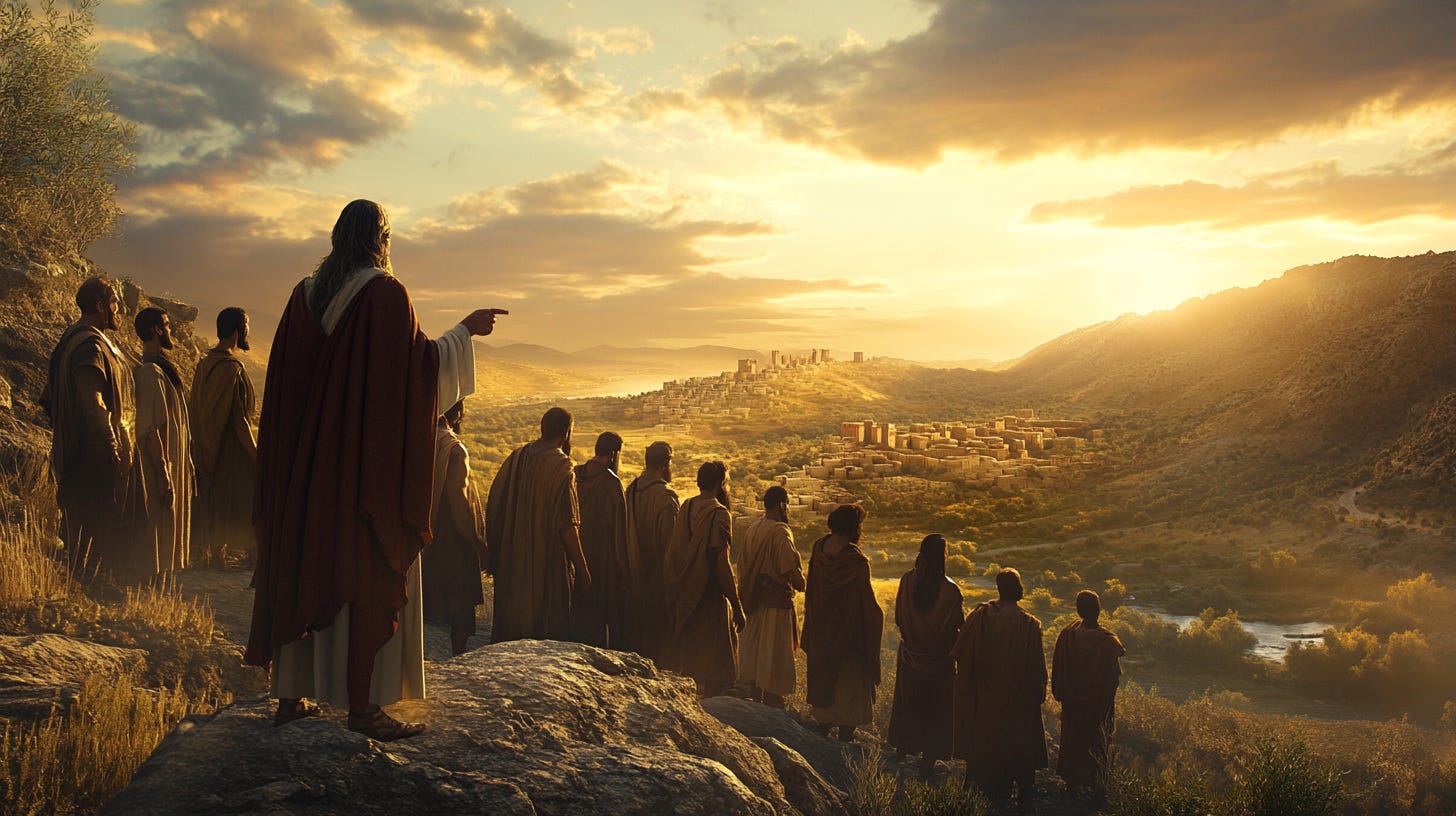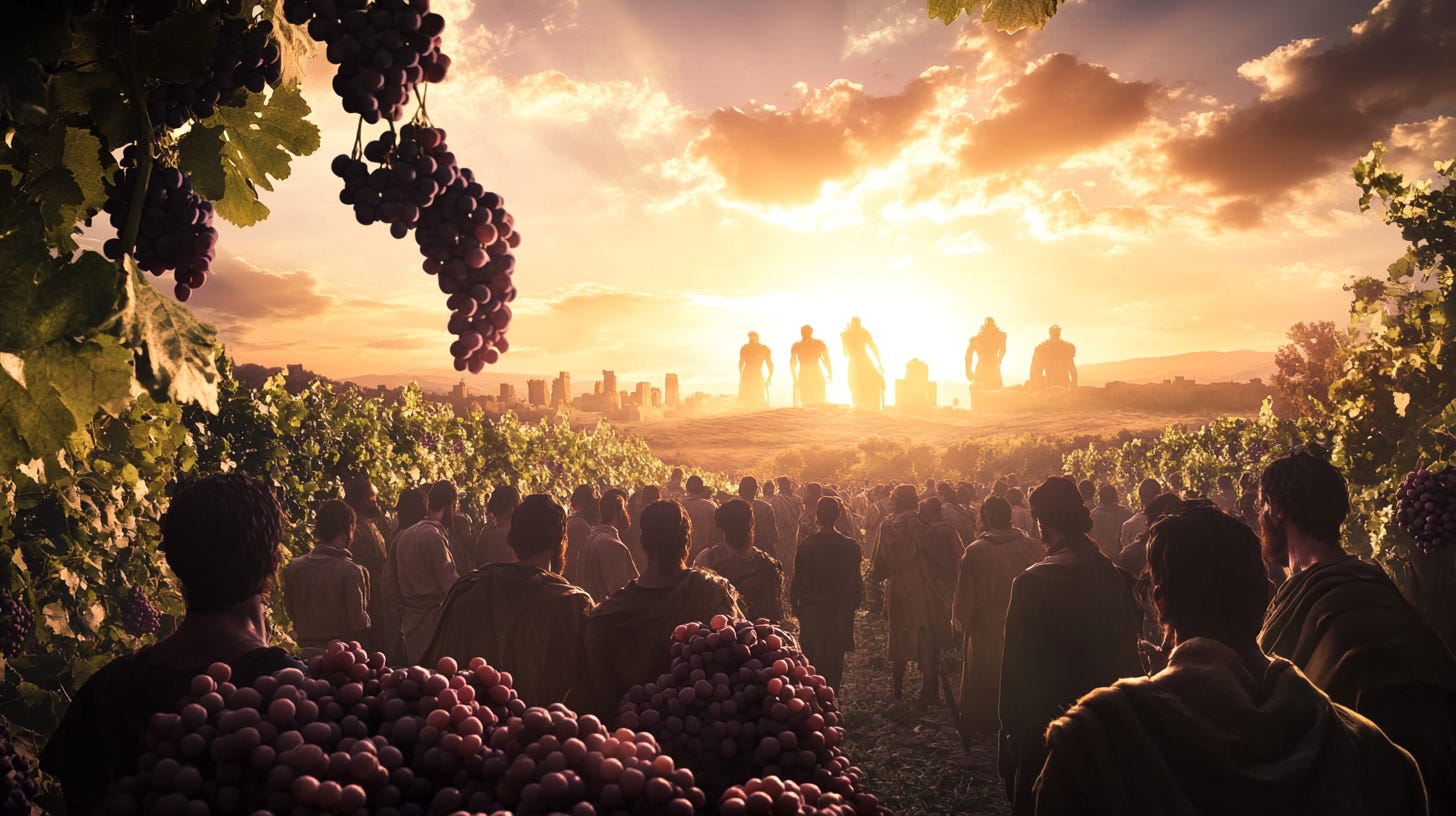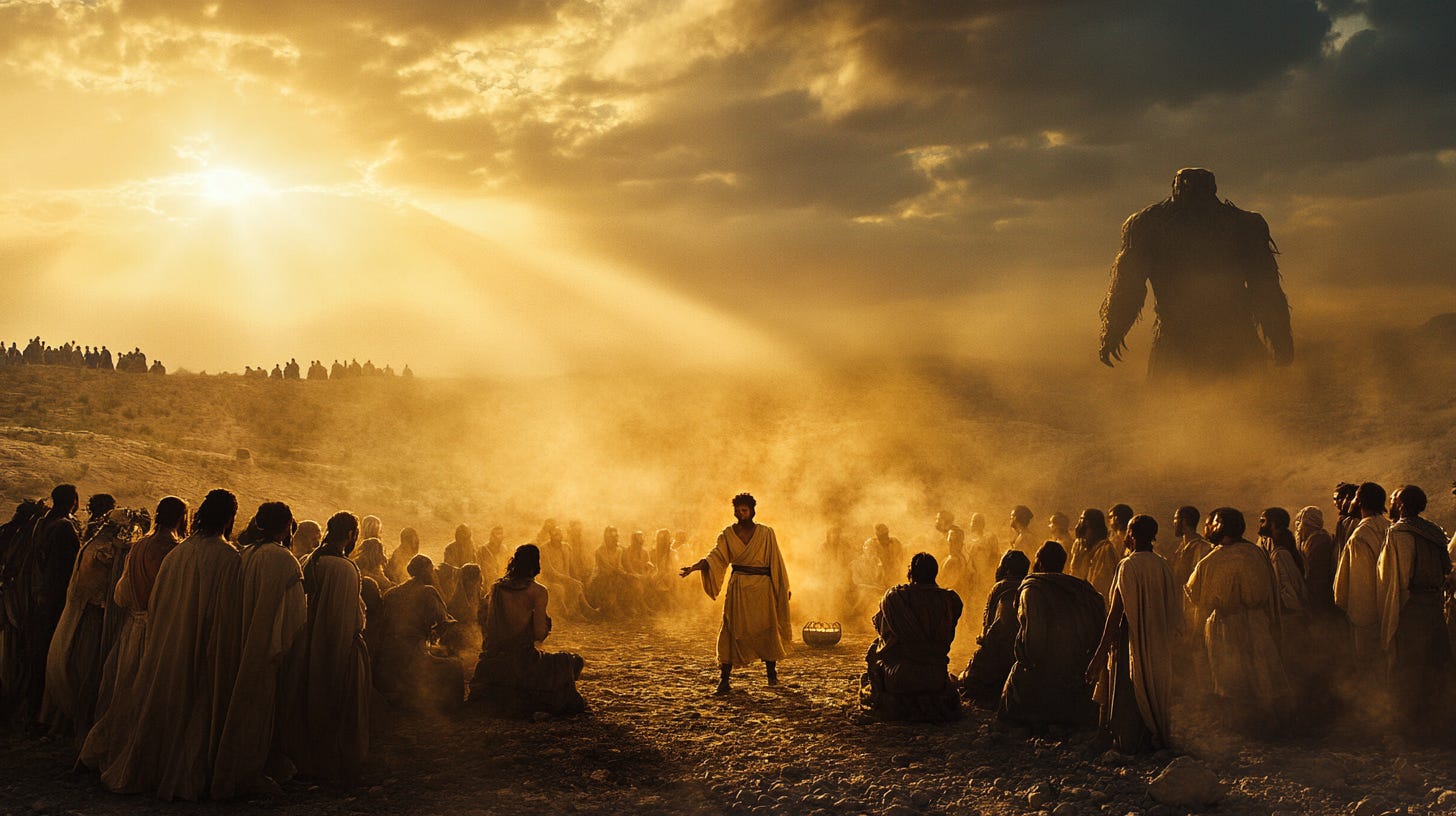Theme
The encounter with the Nephilim in Canaan presents a profound lesson on fear, faith, and the power of God's promises. As Israel stands on the threshold of their inheritance, their response to the giants in the land reveals the tension between human weakness and divine assurance.
Objectives
Understand the significance of Israel's exploration of Canaan and the implications of their fearful report.
Examine the role of the Nephilim as symbols of overwhelming obstacles that challenge faith.
Reflect on the spiritual consequences of fear and unbelief versus the victorious perspective of trusting God.
Scripture Focus
Main Sections
Introduction
Israel’s journey through the wilderness brought them to the edge of the Promised Land, a land flowing with milk and honey, but also inhabited by giants. God's command to explore the land was not for Israel to decide whether to obey but to prepare them for the victory He had already promised. However, when fear overtook faith, the nation faltered at the threshold of destiny.
God's Command to Explore the Land (Numbers 13:1-20)
God instructed Moses to send twelve leaders, one from each tribe, to spy out the land of Canaan. This was a pivotal moment, meant to stir anticipation for the fulfillment of God's promise. Yet, the task also served as a test of Israel's trust in God. Moses directed the spies to observe the land's fruitfulness and strength — a practical mission, yet deeply spiritual in significance. God's invitation to explore the land was a relational call to trust Him. Like Israel, we are invited to step into God's promises, though we often hesitate at the threshold of faith. Just as God walked Israel to the border of their inheritance, so He leads us to places where trust is required Proverbs 3:5-6. The exploration was an opportunity to witness the truth of God's word — a land indeed flowing with abundance. God never asks us for blind faith; He reveals His nature through evidence of His provision, asking us to trust what we see in light of His promises. Standing at Canaan's border was not just about land possession — it was about Israel's role in God's cosmic plan to bless all nations through them Genesis 12:3. The Promised Land symbolized the unfolding of redemptive history. This moment also introduces the tension between divine promise and human perception. The spies were called to see not only with natural eyes but with spiritual vision — a choice between faith in God's power and fear of visible threats.
The Spies' Journey and Report (Numbers 13:21-29)
The spies confirmed the land's goodness, bringing back abundant fruit. Yet, their report was overshadowed by fear as they described powerful inhabitants and fortified cities, including the terrifying mention of the Nephilim. God's people, like us today, often see the "giants" in their path instead of God's promises. The spies' focus on the Nephilim reflects how fear distorts vision, making God's promises seem unreachable. Fear undermines the apologetic witness of God's faithfulness. Instead of testifying to God's provision, the spies' report fueled national panic, demonstrating how distorted testimony can lead people astray. Israel's failure to embrace their role as God's covenant people postponed the fulfillment of God's redemptive plan. Fear and unbelief delayed their destiny to represent God's kingdom on earth. The Nephilim, possibly remnants of pre-flood giants, symbolize demonic resistance to God's purposes — earthly manifestations of cosmic rebellion Genesis 6:4. Yet God had already promised victory, showing His sovereignty over supernatural threats.
The Fear of the Giants: The Nephilim (Numbers 13:30-33)
The spies' fear reached its height in their exaggerated self-perception: "We seemed like grasshoppers." Caleb alone urged faith, reminding Israel that God could defeat any adversary. Fear shrinks our identity. Israel forgot they were God's chosen people, defined by His power, not their weakness. Caleb's faith stands as a model of identity rooted in God's covenant. The contrast between the fearful majority and the faithful minority illustrates the apologetic power of trust — a life of faith speaks louder than words in defending God's truth Hebrews 11:1. Israel's destiny was cosmic — to be God's light to the nations. Fear of giants delayed their mission to reveal God's kingdom on earth. The Nephilim stand as a reminder of the ongoing spiritual battle between God's purposes and demonic opposition. Yet Caleb's courage shows God's people are never meant to fight in their own strength Ephesians 6:12.
Exploring Key Themes
The narrative of Numbers 13 unfolds a cosmic drama that transcends mere historical events. What we witness here is the collision of two kingdoms, two perspectives—human fear confronting divine promise. These giants in the land weren't merely physical obstacles; they represented the ancient manifestation of forces arrayed against God's redemptive purposes since Eden.
Fear and faith cannot coexist in the same heart with equal influence. When the spies declared, "We are not able" Numbers 13:31, they were making a theological statement about who God is and what He can do. Their words betrayed not just doubt about military victory, but doubt about the very character of the God who had parted the Red Sea before their eyes. Faith doesn't deny the presence of giants; it simply recognizes the greater presence of God.
The Nephilim—these "fallen ones"—stand as physical manifestations of spiritual reality. They represent the ongoing cosmic conflict initiated in Genesis 6:1-4 where divine boundaries were crossed, creating hybridity that opposed God's created order. Their appearance in Canaan was no coincidence but part of an ancient strategy to thwart God's redemptive plan through Abraham's seed. The enemy always positions his greatest resistance at the threshold of your greatest inheritance.
Our identity determination is pivotal in every spiritual confrontation. Notice how the spies said, "we became like grasshoppers in our own sight" Numbers 13:33. They defined themselves by the size of their enemy rather than by covenant relationship with God. Caleb, however, stood in the authority of covenant, knowing that in Exodus 19:5-6, God had declared them a royal priesthood, a holy nation. His bold declaration, "We are well able" flows from identity before it manifests as activity.
The tragedy of Israel's response echoes through history as the quintessential warning about the consequences of fear-based decisions. An entire generation forfeited their inheritance, wandering in wilderness spaces when they were meant to rule in promised places. As Psalm 95:10-11 later recalled, God declared: "For forty years I was grieved with that generation...So I swore in My wrath, they shall not enter My rest." Fear always delays destiny; it makes us circle the same mountains when God is calling us to possess kingdoms.
Relational Christianity and Identity in Christ:
The spies' grasshopper complex reveals how we diminish ourselves when we disconnect from our covenant identity. Our vision of God determines our vision of ourselves. When we see God as small, we remain small. Faith isn't positive thinking; it's accurate thinking about who God is and who we are in Him 2 Corinthians 5:17.
Apologetics and the Defense of Faith:
The giants were real, not imagined, yet Israel's response demonstrates how observable facts must be interpreted through the lens of God's promises. Faith doesn't deny reality; it interprets reality through covenant. Physical evidence always requires spiritual interpretation Hebrews 11:1.
Humanity's Cosmic Role and Redemption:
Canaan wasn't just about real estate but about God establishing His kingdom through covenant people. The Nephilim's presence highlights the cosmic significance of Israel's mission. Their failure to advance delayed God's redemptive timeline for the nations Genesis 12:3.
Biblical Theology and the Supernatural Worldview:
The Nephilim represent the tangible manifestation of supernatural opposition to God's purposes. Their presence reveals that the battle for Canaan wasn't merely physical but spiritual. Israel's fear demonstrated a failure to grasp the supernatural dimensions of their calling Ephesians 6:12.
Reflection and Response
Where are you facing giants that challenge God's promises in your life?
How can Caleb's faith inspire your trust in God's provision?
What obstacles are you magnifying above God’s power?
How can faith reframe your vision of impossible situations?
Additional Resources
Video: Book of Numbers Summary: A Complete Animated Overview - Bible Project. Shows how Israel's fear and rejection of God's promise led to wandering in the wilderness—perfectly aligned with your teaching on how fear delays destiny.
Song: See a Victory - Elevation Worship, "See a Victory" echoes the core message of Numbers 13—that even when giants (literal or figurative) stand in our way, the battle belongs to the Lord, and His promises will prevail. The song speaks directly to the struggle of confronting overwhelming obstacles and choosing faith over fear, just like Caleb and Joshua did when faced with the Nephilim and fortified cities.
Key Takeaways
God’s promises stand, even when giants loom large.
Fear distorts, but faith restores proper vision.
Caleb models bold, God-centered faith.
Giants are defeated not by strength, but by trust in God's word.
The account of Israel encountering the Nephilim in Canaan illuminates the timeless struggle between fear and faith that believers face in every generation. This narrative transcends historical context to reveal profound spiritual truths: that our perception of obstacles directly correlates with our view of God, that our identity determines our courage, and that supernatural opposition to God's purposes remains real yet defeatable. Israel's failure at the threshold of promise serves as both warning and wisdom—reminding us that the giants we face today, whether literal or figurative, are not measured against our own strength but against God's covenant faithfulness. In the space between God's promises and their fulfillment stands the critical choice we all must make: to see ourselves as grasshoppers before our giants, or to stand with Caleb in the confident assurance that we are "well able" because our God is greater than all that opposes Him.








